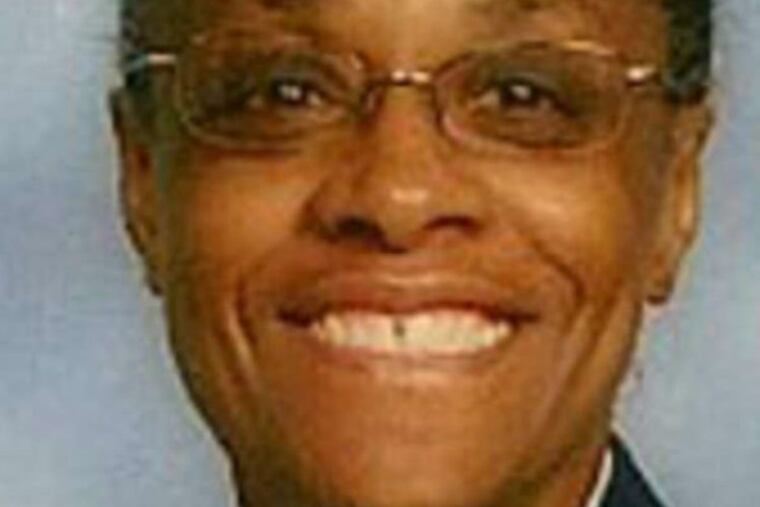Hester Eliza Dixon, 65, 30-year Salvation Army officer
She served all over the U.S. and four years in Liberia, West Africa.

LITTLE DID Robert Dixon know when he saw the attractive girl walking past the playground of Edison High School that getting to know her would change his life.
Robert was in 11th grade at the time, and he was instantly attracted to the girl as she walked by the playground, her head down, arms loaded with books.
He called out a greeting a couple of times, before deciding he'd better introduce himself. She was Hester Eliza Burgess, who was attending Kensington High School, but, more important, and life-altering for both of them, was that she was involved with the Salvation Army.
Hester had started to attend a community center run by the Salvation Army. It provided arts and crafts, recreation, music and other activities - all for 25 cents.
True to his word, Robert introduced himself to Hester, and after high school in 1966, they married. And Hester introduced Robert to the Salvation Army.
Thus began a nearly 50-year association with the organization, gaining rank and leadership roles and serving throughout the United States and in Liberia, West Africa. Both attained the rank of major in the quasimilitary hierarchy of the Salvation Army.
Hester died March 5 of heart failure. She was 65.
Tragically, the Dixons had planned to retire on Saturday with an appropriate ceremony. Instead, Saturday will be the day of her funeral.
Hester's last assignment was in Philadelphia, where she was associate director of operations. Her husband was born and raised in Philly, and she was brought here at age 3 from Spartanburg, S.C., where she was born.
Early in the Dixons' association with the Salvation Army, Hester played the trombone in a marching band. They attended the Salvation Army Seminary in West Nyack, N.Y., and emerged with the rank of lieutenant.
Over the years, the Dixons were dispatched to eight American cities, including two tours in Philadelphia, where they ran numerous programs, all for the benefit of the needy - from food, to education, to arts and crafts, to help for the elderly, and always religious services, because the Salvation Army is a Christian organization.
After they left the seminary, the Dixons' first assignment was Newark, N.J., where teenage street gangs and the violence they generated were major problems.
"We had the kids in the building, off the streets," Robert said. "It was a challenging time."
After 18 months, they were transferred to Brooklyn, N.Y., where they had to deal with a crack-cocaine epidemic and the devastation it caused.
"We had to bury a lot of people," Robert said. "People were shot, committed suicide. It was a violent time."
After Brooklyn, it was back to Philadelphia in 1989, where they became inner-city coordinators, developing programs to help the needy, working in the Salvation Army's 10 worship centers here, setting up Scout troops, and running after-school activities and numerous other projects.
Then, it was on to Cleveland, where one of Hester's most satisfying activities was working with prisoners. She directed a camp in Carrollton, Ohio, for female prisoners who were about to be released. It involved counseling and bringing their children to them.
"She loved doing it," her husband said.
In 1994, the Dixons were sent to Union, N.J., for two years, then to Harlem. "Harlem was exciting," Robert said, "a great place for a ministry."
Hester was instrumental in running a food program for the homeless. When she arrived, they were providing meals once a week, but she started a lunch program, feeding people lunches every day.
"She loved to do things like that, feeding people, taking care of people," Robert said.
The Dixons had been promoted to captain after five years of service, and major after 20 years.
After a stint back in West Nyack, where they did a lot of evangelizing, going out and bringing people into the worship centers, the Dixons were sent to Liberia, West Africa, a country nearly always racked by civil war.
The day they arrived at their headquarters in 2004, a riot was raging in the street outside. It was a taste of what was to come.
Many Salvation Army officers had been forced to leave the country because of the never-ending violence, so the Dixons were mainly involved in rebuilding projects, restoring Salvation Army programs that had been shut down.
In 2008, after four years in Africa, the Dixons were dispatched to Buffalo, N.Y.
After Buffalo, it was back to Philadelphia in 2011. One of the shocks they had to endure was the tragic collapse of the Salvation Army thrift shop, at 22nd and Market streets, that killed seven people in June 2013.
Robert Dixon was regional director of operations and Hester was the associate. Robert became the spokesman for the organization, and afterward, "We prayed for the victims and ministered to the families."
Hester was one of the 12 children of George and Louise Burgess. Besides her husband, she is survived by her mother; a son, Robert Jr.; two daughters, Heather Gibson and Marcia Dixon; six sisters, Hattie Karaam, Mazie Morst, Michelle Onyango, Linda Burgess, Elizabeth Burgess and JoAnn Hay; three brothers, George, David and Steven Burgess; six grandchildren; and three great-grandchildren.
Services: 11 a.m. Saturday at the Salvation Army Kroc Center, 4200 Wissahickon Ave. Friends may call at 9:30 a.m. Burial will be at Merion Memorial Park, Bala Cynwyd.
In lieu of flowers, donations may be made to the Salvation Army, 701 N. Broad St., Philadelphia 19123, for food programs.